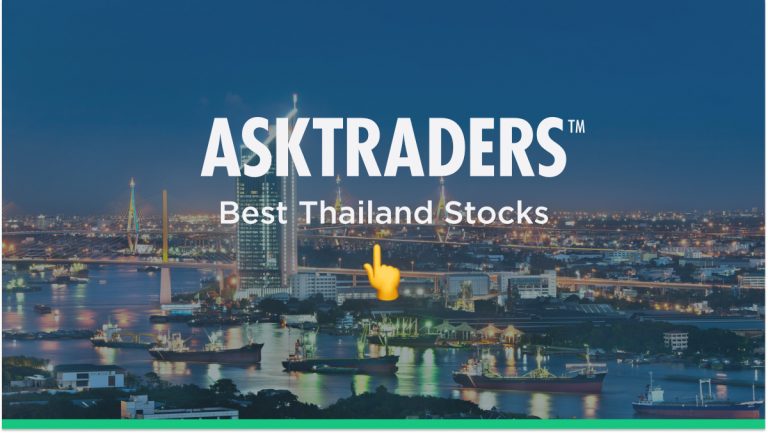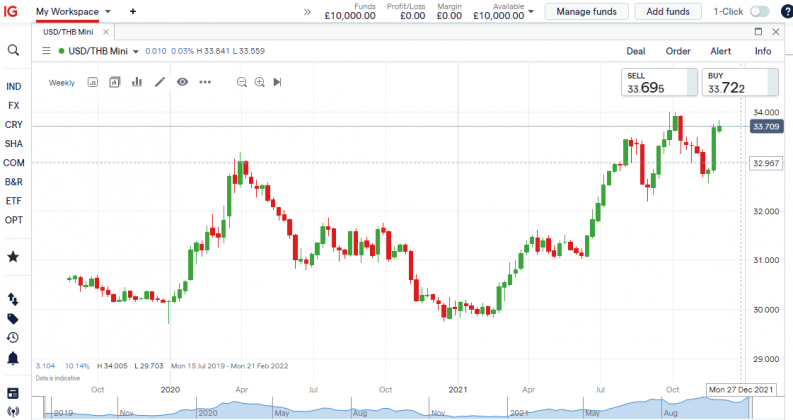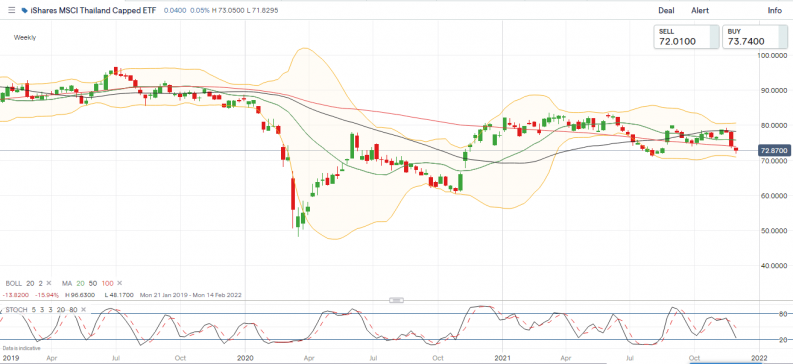
Despite this glowing description, Thailand has had numerous ups and downs over the past several decades, which have resulted in political turmoil and a series of military coups to establish stability. Fortunately, from 1988 to the present, poverty has declined significantly from 65% to below 10% in 2018.
With respect to its neighbours and the world, Thailand is still classified as an “emerging industrialised economy”. To rise above its present level, more investment is necessary, as well as an influx of professional specialists and experts to modernise its existing technological base. The current military leadership coined a phrase in 2016, “Thailand 4.0”, as a “master plan to free Thailand from the middle-income trap, making it a high-income nation in five years”. This plan, however, never anticipated the impact of the Covid 19 pandemic. The World Bank foresaw an economic contraction of nearly 9% for 2020 alone, and the local economy has struggled to regain steam, as have other countries across the globe.
Investors have looked beyond this overarching issue and have taken note that the Thailand investment landscape has several companies worthy of providing above average returns. The local economy does revolve around exports, nearly 60% of GDP, with China being a major trading partner. Positive news from China will have a positive ripple effect upon Thailand. The local government encourages foreign investment with favourable tax benefits as incentives, and the Thai Baht has been stable and appreciating gradually after the Asian Financial Crisis of 1997. It is currently about 0.030 to the US Dollar, having improved from 0.040 over the past two decades, but recently weakened due to Covid issues, as depicted below:

Chart courtesy of IG Group
Stocks are traded on the Stock Exchange of Thailand (SET), which was founded in 1975 and has its headquarters in Bangkok, the largest city in the country and a financial hub for Southeast Asia. With nearly 600 listed companies and a market capitalisation of about $569 billion, it has achieved a ranking of 23rd on a global basis. Tradable instruments include stocks, bonds, derivatives, and ETFs. The exchange also publishes indices that provide information on various sectors of the economy, as well as for Large Cap, Mid Cap, and Small Cap companies. Global brokers will typically offer ETFs that mimic the performance of the top 50 or 100 listings.
How does one invest in Thailand and its economy? The Thai economy is the eighth largest in Asia and the second largest in Southeast Asia behind Indonesia. When per capita effects are taken into account, it ranks fourth in Southeast Asia, behind Singapore, Bruni, and Malaysia. The impact of Covid may have been to retard the growth of Thailand and its neighbours, but signs are that a recovery is underway. Global brokers typically offer participation in an Exchange-Traded Fund (ETF) that tracks popular companies in Thailand, but the more adventurous investor may want to try his hand at individual entities. This approach may require a specialised broker.
One example of a Thailand based ETF is presented in the IG weekly chart shown below:

Chart courtesy of the IG Group
As indicated in the chart, Thailand companies in the ETF group have already begun their recovery from the dramatic downturn caused by the Covid pandemic. The current value of these shares is roughly $73, far better than the Covid floor of $50, but still below its pre-Covid plateau of $90. Charts for individual entities also tend to follow this general dynamic. In summary, the future prospects for the Thailand economy and for major companies within its domain are favourable.
Best shares to buy in Thailand?
- Carabao Group PLC
- Grimm Power Public Co. Ltd
- Gulf Energy Development Public Co. Ltd
- Central Retail Corp. Public Co. Ltd
- Bangkok Bank Public Co. Ltd
- Airports of Thailand Public Co. Ltd
- Kasikornbank Public Co. Ltd.
Based on various analyst suggestions, the following seven individual companies come highly recommended as being prepared to benefit from an economic recovery going forward. All share prices are expressed in Thai Bahts (THB).
- Carabao Group Public Limited Company (CRB): The firm manufactures, markets, sells, manages, and distributes energy drinks and other beverages. It was founded in 2001 and is based in Bangkok. Projected ROE for 2022 puts this company in second place among the SET50 company group. Stock prices hit a peak of 153 in July, but they have declined over the past few months down to a floor of 114, a buying opportunity going forward.
- Grimm Power Public Co. Ltd. (BGRIM): This utility company develops, finances, constructs and operates green-field power plants, both domestic and foreign. It was founded in 1993 and has headquarters in Bangkok. Stock prices have hovered about 40 after gradually declining for a high of 55 in January. Prospects are bright since is has a proven track record for project development.
- Gulf Energy Development Public Co. Ltd. (GULF): This firm is Thailand’s largest producer of power. This includes, Gas, Renewable Energy, Hydropower as well as infrastructure and utilities. The company has underperformed for the past two years, but expectations are that the firm has positioned itself for dramatic growth over the next two years. The company opened its doors in 2011 and is based in Bangkok. Share prices reflect its positioning, as it was flat for the first eight months of 2021, then rose 15 to 20% to its present level of 40 after a pullback from 45 in September.
- Central Retail Corp. Public Co. Ltd. (CRC): This firm focuses on the retail sector and has had its growth curtailed the most by the Covid pandemic, resulting in a bottom positioning in performance in the SET50 group. CRC has been around since 1947 and is a mainstay in fashion, hardline, and food. It is perceived as a good “catch-up play”. Share prices have wavered between 30 and 37 and currently sit at 33.
- Bangkok Bank Public Co. Ltd. (BBL): BBL is a full-service banking institution in Thailand and a leader in the banking sector. The bank was formed in 1944 and is also headquartered in Bangkok. Analysts view the stock as having “deep value”. Share prices are trading at historically low levels, 113, but this value is a mid-level. It began the year at 120, dropped to 102 in May, rose to 128, but came back to earth, a buying opportunity.
- Airports of Thailand Public Co. Ltd. (AOT): This firm operates both airports and hotels and is positioned for a recovery in tourism when that rebound takes place. The company has a long history, beginning in 1903, a mainstay in Bangkok, too. Share prices have bounced between 56 and 70 and currently sit at 60.
- Kasikornbank Public Co. Ltd. (KBANK): KBANK is another banking institution that has a long history in Thailand, beginning in 1945. It is also a full-service bank, positioned for a broader recovery in Thailand’s industrial and tourism bases. Stock prices have hovered between 102 and 150, settling currently at 132.
How to buy stocks in Thailand
Whether you wish to invest in an ETF or an individual company, take advantage of the free demo system provided by your broker to test your investment strategy, availing yourself of both technical and fundamental information for your target investments. Then decide if the broker’s trading platform is user friendly and straightforward.
- Choose a broker: Safety is the primary issue here, but you will want to choose a broker that offers the ETF you desire or has direct access to the SET in Thailand, if you wish to buy shares directly in a domestic company. Check with the local regulator, too, to determine if there have been complaints or dissatisfied traders.
- Open and fund an account: All brokers are required to obtain personal identity information from you before activating an account. Once approved, review the various funding options that your broker provides and choose your preference.
- Open an order ticket and set your position size: Practice submitting a ticket order for a target company or ETF share. Determine the appropriate position size based on risk management principles.
- Set your stops and limits: Your risk management principles will also guide where to place your stop limits. For both position sizing and stop limit selections, it is better to have a practiced strategy rather than a random approach to ensure that a single trade does not end your trading adventure too early in the process.
- Make your purchase: After you are comfortable enough to hit the “Buy” button, be sure to remember that the next step is to monitor your progress. You may set “Take Profit” levels or choose to receive alerts from your broker’s platform, but in any event, be sure to evaluate your position from time to time. Even when a Stop Limit is set, there are times when the market may move so radically that it cannot be applied. Be vigilant.
Summary
The Thailand economy is poised to make a recovery from these post-Covid times. When tourism once again becomes possible at increased levels, various entities in Thailand will benefit handsomely. Even though Thailand is an economy to watch, many global brokers do not offer direct access to its national exchange, the SET. If you wish to bypass trading in a Thailand ETF and select specific companies for investment, take the time to locate a reliable and safe local broker that can provide the direct SET access that you need.
